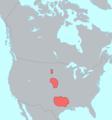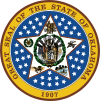Portal:Oklahoma
The Oklahoma Portal Oklahoma (/ˌoʊkləˈhoʊmə/ ⓘ OHK-lə-HOH-mə; Choctaw: Oklahumma, pronounced [oklahómma]; Cherokee: ᎣᎧᎳᎰᎹ, Okalahoma, pronounced [ògàlàhǒːmã́]) is a landlocked state in the South Central region of the United States. It borders Texas to the south and west, Kansas to the north, Missouri to the northeast, Arkansas to the east, New Mexico to the west, and Colorado to the northwest. Partially in the western extreme of the Upland South, it is the 20th-most extensive and the 28th-most populous of the 50 United States. Its residents are known as Oklahomans and its capital and largest city is Oklahoma City. The state's name is derived from the Choctaw words okla, 'people' and humma, which translates as 'red'. Oklahoma is also known informally by its nickname, "The Sooner State", in reference to the Sooners, settlers who staked their claims in formerly American Indian-owned lands until the Indian Appropriations Act of 1889 authorized the Land Rush of 1889 opening the land to white settlement. With ancient mountain ranges, prairie, mesas, and eastern forests, most of Oklahoma lies in the Great Plains, Cross Timbers, and the U.S. Interior Highlands, all regions prone to severe weather. Oklahoma is at a confluence of three major American cultural regions. Historically, it served as a government-sanctioned territory for American Indians moved from east of the Mississippi River, a route for cattle drives from Texas and related regions, and a destination for Southern settlers. There are currently 26 spoken in Oklahoma. According to the 2020 U.S. census, 14.2 percent of Oklahomans identify as American Indians, the highest indigenous population by percentage in any state. A major producer of natural gas, oil, and agricultural products, Oklahoma relies on an economic base of aviation, energy, telecommunications, and biotechnology. Oklahoma City and Tulsa serve as Oklahoma's primary economic anchors, with nearly two-thirds of Oklahomans living within their metropolitan statistical areas. (Full article...) Selected article -The Arkansas River is a major tributary of the Mississippi River. It generally flows to the east and southeast as it traverses the U.S. states of Colorado, Kansas, Oklahoma, and Arkansas. The river's source basin lies in Colorado, specifically the Arkansas River Valley. The headwaters derive from the snowpack in the Sawatch and Mosquito mountain ranges. It flows east into Kansas and finally through Oklahoma and Arkansas, where it meets the Mississippi River. At 1,469 miles (2,364 km), it is the sixth-longest river in the United States, the second-longest tributary in the Mississippi–Missouri system, and the 45th longest river in the world. Its origin is in the Rocky Mountains in Lake County, Colorado, near Leadville. In 1859, placer gold discovered in the Leadville area brought thousands seeking to strike it rich, but the easily recovered placer gold was quickly exhausted. The Arkansas River's mouth is at Napoleon, Arkansas, and its drainage basin covers nearly 170,000 square miles (440,000 km2). Its volume is much smaller than the Missouri and Ohio rivers, with a mean discharge of about 40,000 cubic feet per second (1,100 m3/s). (Full article...)Spotlight city -Bartlesville is a city mostly in Washington County and Osage County, Oklahoma. The population was 37,290 at the 2020 census. Bartlesville is 47 miles (76 km) north of Tulsa and 18 miles (29 km) south of the Kansas border. It is the county seat of Washington County. The Caney River runs through Bartlesville. Bartlesville is the primary city of the Bartlesville Micropolitan area, which consists of Washington County and had a population of 51,843 in 2018. A small portion of the city is in Osage County. The city is also part of the Tulsa Combined Statistical Area, with a population of 1,151,172 in 2015. (Full article...)Selected picture Credit: Katsrcool [1]
Automobile Alley Historic District, an upscale urban neighborhood in Oklahoma City. Featured content
Featured lists: Oklahoma birds • Tallest buildings in Tulsa • List of tallest buildings in Oklahoma City • List of birds of Oklahoma • List of Oklahoma Sooners football seasons • List of Oklahoma Sooners head football coaches • List of Oklahoma Sooners in the NFL Draft State facts
State symbols
Selected biography -William Thomas Hader Jr. (born June 7, 1978) is an American actor, comedian, writer, producer, and director. Hader gained widespread attention for his eight-year stint as a cast member on the long-running NBC sketch comedy series Saturday Night Live from 2005 to 2013, for which he received four Primetime Emmy Award nominations and a Peabody Award. He became known for his impressions and especially for his work on the Weekend Update segments, where he played Stefon Meyers, a flamboyant New York City nightclub tour guide. Hader co-created the HBO dark comedy series Barry (2018–2023) with Alec Berg, in addition to playing the title role as Barry Berkman. He also served as producer, writer and director, for which his efforts garnered him eight Emmy Award nominations for the series. He won two, consecutively, for Outstanding Lead Actor in a Comedy Series. He is a star and producer of the IFC mockumentary comedy series Documentary Now! (2015–present) along with Fred Armisen and Seth Meyers. He was Emmy-nominated for his guest role in Curb Your Enthusiasm in 2022. (Full article...)Did you know -
General images -The following are images from various Oklahoma-related articles on Wikipedia.
Related portalsWikiprojects
Things you can do
Oklahoma topicsCategoriesNew articlesThis list was generated from these rules. Questions and feedback are always welcome! The search is being run daily with the most recent ~14 days of results. Note: Some articles may not be relevant to this project.
Rules | Match log | Results page (for watching) | Last updated: 2024-05-13 21:36 (UTC) Note: The list display can now be customized by each user. See List display personalization for details.
Associated WikimediaThe following Wikimedia Foundation sister projects provide more on this subject:
Discover Wikipedia using portals |





























![Image 25Cartoonist's rendering of Theodore Roosevelt's initial reaction to the Oklahoma Constitution.[needs context] (from History of Oklahoma)](http://upload.wikimedia.org/wikipedia/en/thumb/2/28/Teddyrooseveltoklahomaconstitution.png/120px-Teddyrooseveltoklahomaconstitution.png)
























